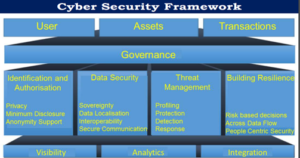Context
Recently, the National Cybersecurity Coordinator has outlined a draft named the ‘Delhi Declaration’ which contains a series of commitments to responsible state behaviour in cyberspace for G20 member countries.About the draft:
- The draft drawn contains non-binding norms that they have already signed onto under United Nations Centre on Transnational Corporations (UNCTC).
- The basic provisions would include that the G20 countries would commit to;
- Not damage critical infrastructure or other essential systems;
- Commit to cooperate, mitigate and investigate cyber incidents, and other malicious activities in cyberspace like ransom ware;
- Commit to protect and not disrupt software supply chains;
- Commit to respect international law and rule of law in cyberspace; and
- Also commit to protecting the humanitarian sector.
The Delhi Declaration and UNCTC:
|
- Cyberspace has inherent vulnerabilities that cannot be removed innumerable entry points to internet.
- Assigning attribution: Internet technology makes it relatively easy to misdirect attribution to other parties.
- Computer Network Defense techniques, tactics and practices largely protect individual systems and networks rather than critical operations (missions)
- Attack technology outpacing defense technology
- Nation states, non-state actors, and individuals are at a peer level, all capable of waging attacks.

- The G20 is an informal group of 19 countries and the European Union, with representatives of the International Monetary Fund and the World Bank.
- G20 is the premier forum for international economic cooperation representing around 85% of the global GDP, over 75% of the global trade, and about two-thirds of the world population.
- It includes 19 countries, including, Italy, Japan, the Republic of Korea, Argentina, Australia, Brazil, Germany, India, Indonesia, Canada, South Africa, Turkey, the UK, the USA, China, France, Mexico, Russia, Saudi Arabia, and the European Union (EU).
India in G20 Ecosystem:
|
- Green Development, Climate Finance & Life:
- The opportunity to lead G20 comes at a time of compounding existential threat, with the COVID-19 pandemic having exposed the fragilities of our systems under the cascading impacts of climate change.
- Understanding that the issue of climate change cuts across industry, society, and sectors, India offers the world Life (Lifestyle for Environment) -a behaviour-based movement that draws from our nation’s rich, ancient sustainable traditions to nudge consumers, and in-turn markets, to adopt environmentally-conscious practices.
- Accelerated, Inclusive & Resilient Growth:
- An accelerated, resilient and inclusive growth is a cornerstone for sustainable development. During its G20 Presidency, India aims to focus on areas that have the potential to bring structural transformation.
- Accelerating progress on SDGs:
- India’s G20 Presidency collides with the crucial midpoint of the 2030 Agenda. As such, India acknowledges the detrimental impact of COVID-19, which changed the current decade of action into a decade of recovery. In line with this perspective, India wants to focus on recommitting G20’s efforts to achieving the targets laid out in the 2030 Agenda for Sustainable Development
- Technological Transformation & Digital Public Infrastructure:
- As G20 Presidency, India can foreground its belief in a human-centric approach to technology, and facilitate greater knowledge-sharing in priority areas like digital public infrastructure, financial inclusion, and tech-enabled development in sectors ranging from agriculture to education
- Multilateral Institutions for the 21st century:
- India’s G20 priority will be to continue pressing for reformed multilateralism that creates more accountable, inclusive just, equitable and representative multipolar international system that is fit for addressing the challenges in the 21st century.
- Women-led development:
Post Views: 254
